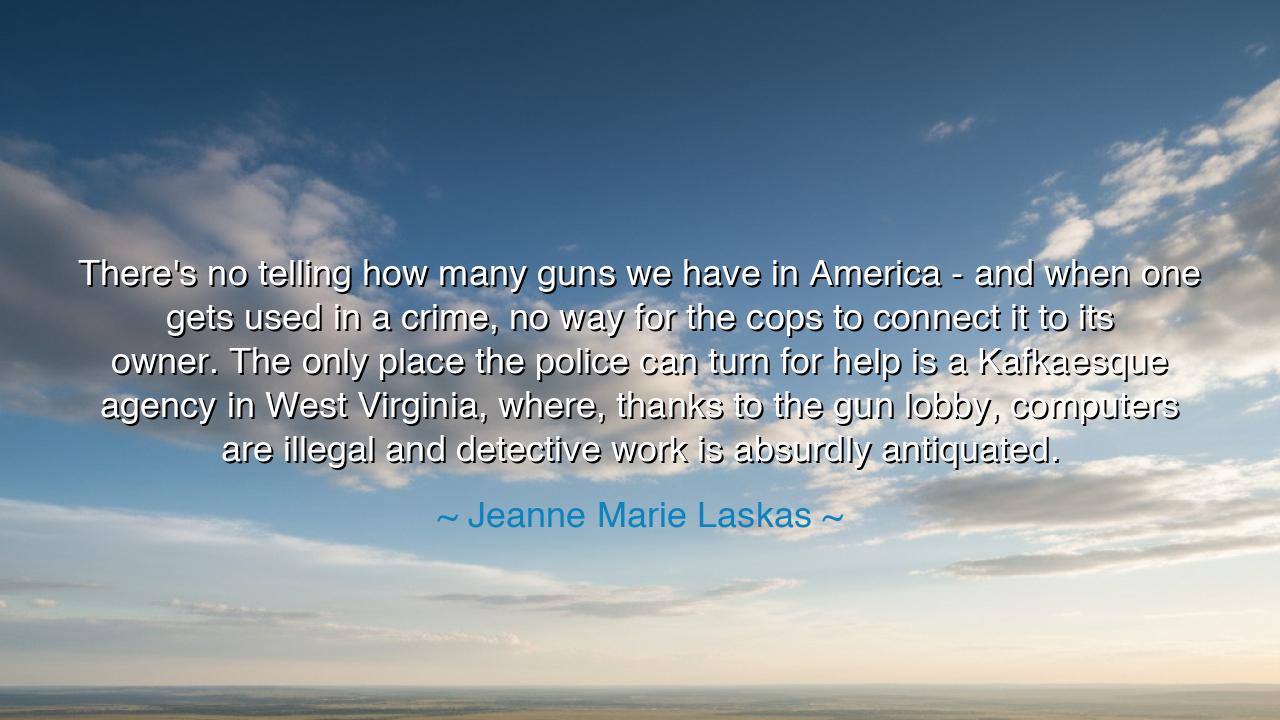
There's no telling how many guns we have in America - and when
There's no telling how many guns we have in America - and when one gets used in a crime, no way for the cops to connect it to its owner. The only place the police can turn for help is a Kafkaesque agency in West Virginia, where, thanks to the gun lobby, computers are illegal and detective work is absurdly antiquated.






In the searing and sorrowful words of Jeanne Marie Laskas, chronicler of the hidden and human truths of modern America, there burns both outrage and lament: “There’s no telling how many guns we have in America – and when one gets used in a crime, no way for the cops to connect it to its owner. The only place the police can turn for help is a Kafkaesque agency in West Virginia, where, thanks to the gun lobby, computers are illegal and detective work is absurdly antiquated.” These words are not simply an observation; they are a cry from the heart of a civilization ensnared by its own contradictions — a nation that celebrates freedom yet trembles beneath the weight of its weapons. Laskas, with the sharpness of both journalist and moral witness, exposes the strange paralysis of a society that, while armed to the teeth, has forgotten how to see clearly through the smoke of its own making.
The origin of this quote lies in Laskas’s fearless investigation into the Bureau of Alcohol, Tobacco, Firearms and Explosives (ATF), and the mountain of paper records that define its work. In an age when every click, purchase, and identity can be traced in seconds, she discovered an irony worthy of the ancient tragedians: that the most lethal instruments of modern America — its guns — are shielded by law from being traced by technology. In West Virginia, where this “Kafkaesque” agency resides, computers are forbidden from creating a searchable gun database. Piles of yellowed paper and microfilm stand where databases should be. Investigators must sift by hand through millions of records, like monks deciphering scrolls in a burning monastery, while the trail of violence grows cold.
To call this system Kafkaesque is no exaggeration, but a profound metaphor. In the works of Franz Kafka, men are trapped within systems so absurd that reason becomes helpless. Laskas sees the same madness at work in a nation where logic is outlawed by ideology, and where the pursuit of safety is shackled by the worship of liberty gone astray. Here, the police, the guardians of justice, are forced to labor in the shadows, denied the very tools that might prevent another tragedy. This, she tells us, is not mere inefficiency — it is the reflection of a moral blindness, the kind that comes when power and fear weave together to silence reform.
And indeed, history is filled with examples of civilizations that lost their way when they mistook privilege for principle. In the waning days of the Roman Republic, the people’s faith in their institutions faltered as violence became the language of power. Senators spoke of freedom even as they armed their private militias, until the republic collapsed into tyranny. So too, Laskas warns, may modern societies falter when the instruments of protection become the instruments of fear — when the tool becomes the master, and laws meant to defend life instead perpetuate its destruction.
But Laskas does more than expose the absurd; she illuminates the deeper human cost. Behind each untraceable gun lies a shattered story — a life taken, a family undone, a detective whose search for justice is thwarted by a wall of paper. The antiquated system she describes is not merely inefficient; it is cruel. It mocks the very idea of accountability. To her, this is not a bureaucratic failure, but a moral one: a failure of courage, compassion, and collective will. The gun lobby, in her telling, is not just a political entity — it is the embodiment of a national denial, a refusal to confront the shadow we ourselves have cast.
Yet her tone, though critical, is not one of despair. Like the prophets of old, her outrage is born of love — love for her country and faith in its potential for reform. By invoking the absurdity of the present, she calls forth the possibility of transformation. Her words demand that we awaken, that we see clearly what complacency has concealed. For if detective work is “absurdly antiquated,” then so too is our morality, if it cannot evolve to meet the reality of our times. To change this, we must reclaim the ancient virtues of justice, reason, and responsibility — not as political slogans, but as living principles.
The lesson, therefore, is both personal and collective. Each of us must ask: what is the cost of our silence? How many systems remain broken because we accept absurdity as inevitable? To honor the meaning of Laskas’s words, we must not retreat into cynicism, but act. Demand transparency. Support reform that bridges the gap between technology and morality. Speak truth even when it is inconvenient. For justice, like health, cannot thrive in neglect.
And so, children of the new century, heed the wisdom of Jeanne Marie Laskas: when power becomes irresponsible, outrage must become the beginning of change. Do not accept the madness of systems that deny reason, nor the excuses of those who profit from fear. For if we do not confront absurdity, it will define us. Let us, then, be the generation that replaces antiquation with wisdom, secrecy with accountability, and fear with courage. For only when knowledge serves truth — and truth serves life — shall a nation find peace again.






AAdministratorAdministrator
Welcome, honored guests. Please leave a comment, we will respond soon